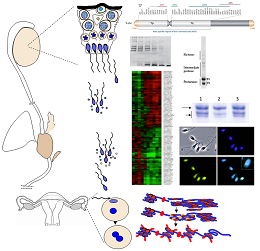Dr. Alexandra Amaral is currently a Postdoctoral Fellow at Max Planck Institute for Molecular Genetics, in Germany. She performed her first Postdoctoral training at our laboratory between 2010 and 2014.
EDUCATION
2010: Ph.D. in Cell Biology, University of Coimbra, Portugal
2009: Frontiers in Reproduction Course - Molecular abd Cellular Concepts and Applications, Marine Biological Laboratory, Woods Hole, MA, USA
2003: First year of the Master's Degree in Cell Biology, University of Coimbra
2002: B.Sc. in Biology, University of Coimbra
GRANTS AND AWADS
Grants
Postdoctoral grant (2009 - To Date), by the Portuguese Foundation for Science and Technology (FCT; SFRHD/BPD/63120/2009)
Ph.D. grant (2003 - 2007), by FCT (SFRH/BD/12665/2003)
Research technician grant (2002 - 2003), by FCT (BTI-06-02)
Awards
Young Researcher Prize (2011), by the British Andrology Society (BAS), at the 33rd BAS Annual Meeting
First prize for selected oral communication (2008), by Tambre Foundation, at the International Symposium on Assisted Reproduction
Best selected oral presentation (2006), by the European Academy of Andrology (EAA), at the 4th European Congress of Andrology
Travel grants
6th European Congress of Andrology (2010), by EAA and the International Network for Young Researcher in Male Fertility (INYRMF)
MBL Frontiers in Reproduction Course (2009), by Burroughs Welcome Fund
Frontiers in Reproduction 12th Annual Symposium (2009), by Luso-American foundation (FLAD)
Lalour Foundation International Travel Award (2008), by the American Society of Andrology (ASA) and the ASA International Liasion Commitee
ASA 3rd Annual Meeting (2008), by FLAD
SCIENTIFIC SOCIETIES
International Network for Young Researchers in Male Fertility (INYRMF)
President (from May 2013)
Board member (from 2010)
American Society of Andrology (ASA)
Member of the Trainee Affairs Commitee (from January 2013)
Member (from 2008)
The publications derived from her postdoctoral stay in our lab are listed below:
Publications
7: Paiva C, Amaral A, Rodriguez M, Canyellas N, Correig X, Ballescà JL, Ramalho-Santos J, Oliva R.
Identification of endogenous metabolites in human sperm cells using proton nuclear magnetic resonance ((1) H-NMR) spectroscopy and gas chromatography-mass spectrometry (GC-MS).
Andrology. 2015;3:496-505.
6: Amaral A, Paiva C, Attardo Parrinello C, Estanyol JM, Ballescà JL, Ramalho-Santos J, Oliva R.
Identification of proteins involved in human sperm motility using high-throughput differential proteomics.
J Proteome Res. 2014;13:5670-84.
5: Castillo J, Amaral A, Azpiazu R, Vavouri T, Estanyol JM, Ballescà JL, Oliva R.
Genomic and proteomic dissection and characterization of the human sperm chromatin.
Mol Hum Reprod. 2014;20:1041-53.
4: Azpiazu R, Amaral A, Castillo J, Estanyol JM, Guimerà M, Ballescà JL, Balasch J, Oliva R.
High-throughput sperm differential proteomics suggests that epigenetic alterations contribute to failed assisted reproduction.
Hum Reprod. 2014;29:1225-37.
3: Castillo J, Amaral A, Oliva R.
Sperm nuclear proteome and its epigenetic potential.
Andrology. 2014;2:326-38.
2: Amaral A, Castillo J, Ramalho-Santos J, Oliva R.
The combined human sperm proteome: cellular pathways and implications for basic and clinical science.
Hum Reprod Update. 2014;20:40-62.
1: Amaral A, Castillo J, Estanyol JM, Ballesca JL, Ramalho-Santos J, Oliva R.
Human sperm tail proteome suggests new endogenous metabolic pathways.
Mol Cell Proteomics. 2013 Feb;12(2):330-42.


